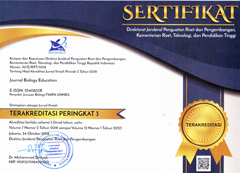The Influence of The NHT Type Cooperative Learning Model Assisted by Problem Based LKPD on Critical Thinking and Collaboration Skills in Environmental Change Material
Keywords:
NHT, problem-based LKPD, critical thinking, collaboration, environmental change.Abstract
At SMA Negeri 1 Tengaran, students' critical thinking and collaboration skills in environmental change material are still low. This is reinforced by student learning results in environmental change material which show that only 40.62% of students meet the criteria for achieving learning objectives and the results of the collaboration skills questionnaire which show that 32.3% of students find it difficult to collaborate with friends. These results are motivated by the low level of student involvement in learning so that a student-centered learning model is needed, such as the NHT type learning model assisted by problem-based LKPD. This learning model can train critical thinking skills through learning activities that invite students to think in solving problems on the LKPD while also training students' collaboration skills through group collaboration. The aim of this research is to analyze the effect of implementing the NHT type learning model assisted by problem-based LKPD on students' critical thinking and collaboration skills in environmental change material. The research is Pre-Experimental research with one group pretest-posttest. The research sample consisted of classes X-1, X-4 and X-5 which were selected using purposive sampling techniques. Critical thinking skills data were analyzed using the paired sample T-test while collaboration skills data used the Wilcoxon test. The results of the Paired Sample T test show a significance value of 0.000 (<0.05), meaning that the use of the NHT model assisted by problem-based LKPD has an effect on students' critical thinking skills. Each aspect of critical thinking has an N-gain value > 0.3 with the highest N-Gain in the indicators of advanced clarification and strategies & tactics. For the collaboration variable, the results of the Wilcoxon test show an Asymp.Sig.(2-tailed) value of 0.000 (<0.05), meaning that the use of the NHT model assisted by problem-based LKPD has an effect on collaboration skills. Each aspect of collaboration has an N-gain value > 0.3 (medium category) with the highest N-Gain in the indicator of working in a group. Based on these results, it can be concluded that the application of the NHT model assisted by problem-based LKPD has an effect in improving students' critical thinking and collaboration skills at SMA Negeri 1 Tengaran in environmental change material. The results of this research can be used as an alternative learning model to improve students' critical thinking and collaboration skills.





